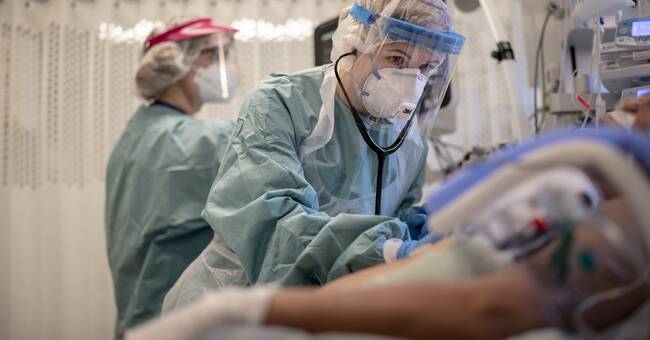Recently, the reports of the extremely hard pressure on healthcare in Skåne have replaced each other.
The child intensive care unit in Lund is also completely full, as more children with urgent medical needs in the suites of covid-19 have come in and are cared for side by side with children who need intensive care for other reasons.
- We see that children who have had covid suffer from this inflammatory syndrome, MIS-C, three to six weeks after the infection, says Maria Mossberg, chief physician at the pediatric clinic in Lund.
Her colleague, the pediatric rheumatologist Robin Kahn, says that Skåne has had six serious cases in recent weeks, four of which have been treated in the intensive care unit.
- Everyone is inside.
They are so ill that they need multidisciplinary care, he says.
The affected children receive medicines that slow down the immune system's attacks on the organs, and advanced care that supports the organs that fail.
They participate in a national and international collaboration on the new disease.
Second wave
Petter Brodin, pediatrician and immunologist at Karolinska Institutet and Karolinska University Hospital, is part of that collaboration.
He states that MIS-C, (multisystem inflammatory syndrome in children associated with covid-19) is well known at this time.
- We have had about a hundred children with MIS-C in Sweden.
It has come as a second wave after the summer and right now we have quite a few children being treated for it.
But we still have no deaths, says Petter Brodin, who together with a group of researchers has published a study on the previously unknown condition in the scientific journal Cell.
Researchers now know that the condition is caused by the body's immune system being activated by the coronavirus infection - which may not even be noticed - and then shows up one to two months later when the immune system has begun to attack its own body in various ways.
Healthy children
Common symptoms are high fever, severe abdominal pain, confusion and failing heart function.
- We believe that the body simply attacks itself - that something went wrong in the first defense against the infection and that it then leads to an overactivation later, says Petter Brodin.
Most sufferers have not noticed their infection, but have been completely asymptomatic.
- It is about previously completely healthy children.
We see everything from toddlers to young adults.
The treatment, which the researchers have seen work, is to try to stifle the immunological attack
- We who are most used to this want to be involved in the treatment, because it is not always so clear that children have been affected by this particular condition.
It can sometimes be difficult to distinguish from a serious bacterial infection and then you should not turn off the immune system.
Needs intensive care
Of the almost 100 children affected by MIS-C in Sweden, the severity of the condition has varied.
About thirty have been life-threateningly ill and needed intensive care.
- They have needed maximum intensive care, says Petter Brodin.
You have previously said that you should look at whether the vaccine against covid-19 can trigger the syndrome. What have you seen?
- So far, there is no indication that this would be the case, but we are keeping a very close eye on that issue.
But one must remember that there are very few children who have been vaccinated in the world, says Petter Brodin.
The knowledge he and his research team has accumulated is spread both in Sweden and internationally.
- Every Monday I am part of an international network where we talk about these patients.
In the world, one sees a second and third wave of this condition.
England has had many cases in recent months.
More are affected
State epidemiologist Anders Tegnell is not surprised by the alarms that the child intensive care unit in Lund is fully booked.
- In Skåne, we have a much greater spread of infection in society than we had last spring.
Of course, this means that more children are affected, he says at Tuesday's press conference with the Swedish Public Health Agency.
However, he emphasizes that it is still rare on the whole that children and young people become seriously ill.
- The older you are, the greater the risk of getting sick, he says.

